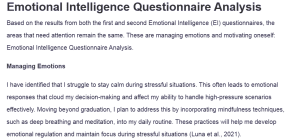Emotional Intelligence Questionnaire Analysis
Based on the results from both the first and second Emotional Intelligence (EI) questionnaires, the areas that need attention remain the same. These are managing emotions and motivating oneself: Emotional Intelligence Questionnaire Analysis.
Managing Emotions
I have identified that I struggle to stay calm during stressful situations. This often leads to emotional responses that cloud my decision-making and affect my ability to handle high-pressure scenarios effectively. Moving beyond graduation, I plan to address this by incorporating mindfulness techniques, such as deep breathing and meditation, into my daily routine. These practices will help me develop emotional regulation and maintain focus during stressful situations (Luna et al., 2021).
Motivating Oneself
Persistence is another area I need to improve, especially when performing challenging or repetitive tasks. I often find myself losing motivation when the work becomes monotonous. To strengthen my motivation, I will set smaller, more achievable goals and reward myself upon accomplishing them. This incremental approach will help me maintain momentum and stay focused on long-term objectives, even when tasks feel overwhelming.
Change Over the Semester
When comparing the results from the first and second EI questionnaires, I have noticed some improvement, but the challenges with managing emotions and self-motivation persist. While I have attempted mindfulness techniques and set more realistic goals for myself, I still find it difficult to maintain consistency in applying these strategies. Therefore, there is a need for continued practice and dedication in these areas.
Benefits of Emotional Intelligence in Nursing
A strong EI will significantly benefit my future career as a Registered Nurse (RN). As a nurse, effective communication and empathy are essential in understanding patient needs and providing compassionate care. Emotional intelligence also plays a critical role in teamwork, allowing me to collaborate more effectively with colleagues. By continuing to strengthen my EI, I will be better equipped to handle the emotional challenges of the healthcare environment and provide the highest level of care to patients.
References
Luna, L. M. B., Vilar, M. M., Soto, C. M., & Santiago, J. L. C. (2021). Emotional Intelligence Measures: a Systematic Review. Healthcare, 9(12), 1696. https://doi.org/10.3390/healthcare9121696
ORDER A PLAGIARISM-FREE PAPER HERE
We’ll write everything from scratch
Question 
Step 4: Emotional Intelligence Questionnaire Analysis
(complete per clinical instructor timeline) – Use of AI on this assignment prohibited.
Consider the results of your 2nd EI Questionnaire. List 2 areas that fell into the “development priority” or “needs attention” categories. Are these the same two items or are they new (identify as new or same)? What action that you can take moving beyond graduation to strengthen your emotional intelligence in that area. (100 words)

Emotional Intelligence Questionnaire Analysis
1.
2.
Consider the results of your 1st EI Questionnaire and your 2nd EI Questionnaire. Have you seen any changes during the semester? Why or why not? (100 words)
Consider your future career as a RN. How do you see that a strong EI could benefit your career? (100 words)